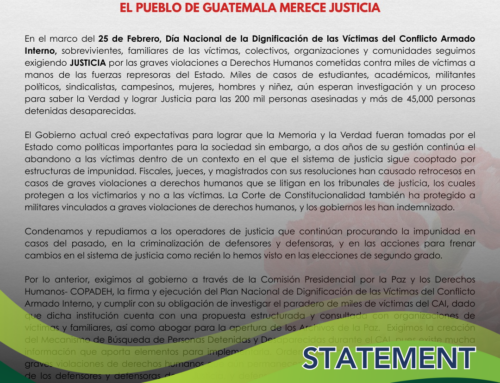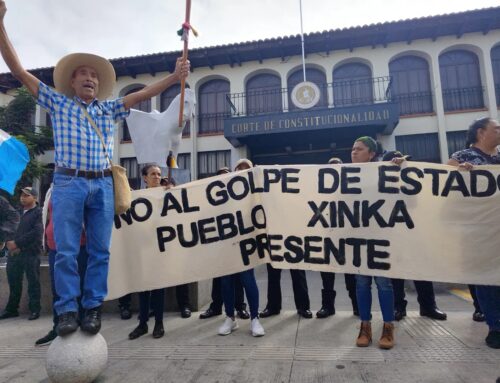“The past is still present.”
— Independent journalist, commenting on recent attacks against activistson the eve of the Ríos Montt trial
The four Xinca leaders were on their way home from observing a community consultation in El Volcancito, San Rafael Las Flores when they were attacked. The community consultation is the third in a series of 26 referenda planned in the municipality. Read more about the
ongoing consultation process.
 |
| El Volcancito holds a community consultation on March 17 (credit: NISGUA) |
In response, Interior Minister Mauricio López Bonilla made statements in the press conflating the non-violent community organizing in the municipalities of Mataquescuintla and San Rafael Las Flores with this and other recent violence. His comments are further evidence of ongoing stigmatization and criminalization of human rights defenders in Guatemala, an issue that was raised specifically with regard to the situation in San Rafael Las Flores in the UN’s report on Guatemala delivered this January.
On Friday, March 15, human rights defender and member of the Departmental Assembly of Huehuetenango (ADH),
Rubén Herrera, was arrested for alleged crimes committed in relation to the Barillas case, a conflict stemming from the Guatemalan government’s lack of respect for the community consultation process carried out in 2007. Despite a clear rejection of large-scale development projects in their territory, the government granted Hidro Santa Cruz S.A. permission for construction of the Cambalam hydroelectric dam.
In a hearing held on Tuesday, March 19, Herrera was denied bail and accused of 12 crimes, including kidnapping and terrorism. Despite arguments from the defense team and the Public Prosecutor’s office demonstrating the lack of evidence linking him to these crimes, the judge denied Herrera’s bail and ordered the case to move to pretrial proceedings on May 30. Read the ADH urgent communique
here.
 |
Rubén Herrera of the ADH (credit: James Rodríguez, mimundo.org)
|
NISGUA stands in solidarity with the Rubén Herrera and the Departmental Assembly of Huehuetenango in denouncing the systematic criminalization and persecution of community leaders and human rights defenders.
These incidents come on the heels of the Constitutional Court decision to uphold the 1997 Mining Law against a constitutional challenge presented by the Western Peoples’ Council (CPO) for lack of prior consultation with indigenous peoples. The current mining law fails to fulfill national and international mandates that require the State to consult with indigenous people regarding projects or policies that will significantly impact their territories.
NISGUA, together with the Coalition against Unjust Mining in Guatemala, submitted a press release critiquing the Guatemalan Government’s denial of justice for indigenous peoples affected by mining.
“Not only is this ruling a negation of justice, it is a negation of the existence of indigenous peoples’ right to participate as political actors,” said Francisco Mateo Rocael, representative of the Western Peoples’ Council in response to the Court’s ruling. Read NISGUA’s full translation of the
CPO statement.
NISGUA has accompanied communities and organizations resisting Tahoe’s Escobal project since 2011. NISGUA also works closely with the Departmental Assembly of Huehuetenango (ADH) in their efforts to promote self-determination and alternative visions of development in the highland department of Huehuetenango. The ADH receives international human rights accompaniment from NISGUA through the ACOGUATE project and participated in NISGUA’s 2010 tour.







Leave A Comment